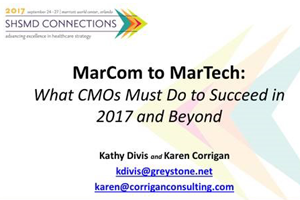At last month’s SHSMD Connections conference, Kathy Divis and Karen Corrigan presented a session on “MarCom to MarTech: What CMOs Must Do to Succeed in 2017 and Beyond.” Kathy is President of Greystone.Net and Karen is CEO at Corrigan Consulting.
The session was jam-packed with content, but here are some highlights from their talk:
- Most marketing organizations are “doing digital,” not “being digital.” They are making incremental changes rather than weaving digital in their marketing DNA.
- According to Scott Brinker, in the past decade, marketing has gone from being one of the least tech-dependent business functions to one of the most.
- Digital health adoption by consumers continues to increase. In 2016, 46% of consumers were considered active digital health adopters, using three or more categories of digital health tools. Only 12% of Americans are non-adopters.
- The “marketer scientist” is a combination of art and science who is a:
- Storyteller
- Data analyst
- Brand champion
- Experimentalist
- Experience designer
- Technologist
- Change agent
- Systems thinker
- Marketers should concentrate on the most common tech trends with the closest short-term impact. However, they must keep an eye on the emerging technologies that are just around the corner in order to not be caught off guard when those new technologies burst onto the scene.
- Marketing trends to watch include:
- The transition from advertising to brand experience
- The continued rise of the empowered customer
- The emergence of mixed reality—virtual and augmented
- The impact of machine learning, artificial intelligence and the Internet of Things (IoT)
- The inevitability of mobile-only customers
- Merging the art and science of marketing, including CRM, marketing automation and personalization.
- In light of consumerism – “a movement that advocates patients’ involvement in their own healthcare decisions” – previously passive patients are now empowered consumers with unlimited access to information, more choices and greater responsibility for the cost of care.
- Healthcare competition no longer consists of just “the colleague down the road,” but also includes the retail store across the street and virtual providers.
- Self-scheduling is ground zero for health systems.
- 80% of healthcare consumers prefer providers with online scheduling.
- 67% choose online scheduling over location.
- 33% say online scheduling will increase the likelihood of making an appointment.
- The primary point of differentiation between retail and healthcare is retail’s catering to consumer convenience. According to Rob Klein at Klein & Partners, the retail world is learning healthcare faster than healthcare is learning retail.
- WebMD is now a “skill” for Amazon Echo’s Alexa. How much longer will it be before you can ask Alexa for an internal medicine physician recommendation within 5 miles, with a new patient opening today or tomorrow?
- Other real-life examples of artificial intelligence (AI), machine learning (ML) and Internet of Things (IoT) include:
- Lenovo has expanded virtual care by enabling Amazon Echo’s Alexa to contact a patient’s care coordinator to send a driver to pick the patient up or take the patient’s blood pressure and send the result to the patient’s provider.
- HealthTap’s Alexa skill called Doctor AI provides real-time feedback on basic symptoms and if the situation is deemed serious per the platform’s algorithm, the patient is connected to one of 100,000 online doctors.
- KidsMD is a voice-driven skill created by Boston Children’s Hospital that answers questions about symptoms, medication dosing and whether to call a provider.
- Mobile is the new gateway to your brand. Therefore, your mobile presence is your organization’s new virtual front door.
- You must make it a priority to integrate technologies, processes and teams, so actions customers take on mobile devices are tied to your CRM and marketing automation systems.
- Dramatic change is revolutionizing healthcare marketing and much of that change is interconnected. Every marketer at every level needs to become digitally savvy and data intelligent.
- Today’s contemporary marketing department demands staff with new skillsets, fresh thinking, different priorities and new approaches to organizational structure.
- It’s time to begin walking away from the siloes of “traditional” and “digital” marketing and realize it is all just MARKETING.
If you would like a copy of the complete slide deck from this presentation, please contact Greystone.Net at info@greystone.net.